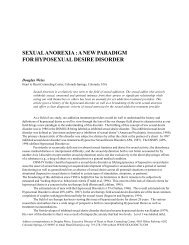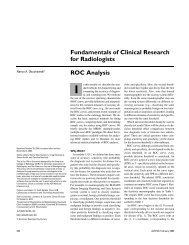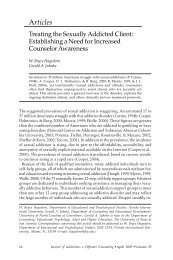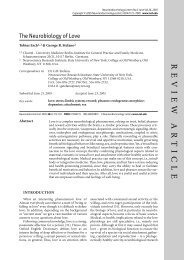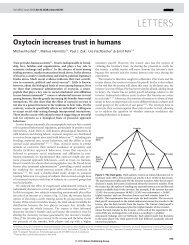An Overview of Psychiatric Ethics
An Overview of Psychiatric Ethics
An Overview of Psychiatric Ethics
You also want an ePaper? Increase the reach of your titles
YUMPU automatically turns print PDFs into web optimized ePapers that Google loves.
6. Psychiatrists addressing the media: In all contacts with the media psychiatrists shallensure that people with mental illness are presented in a manner which preserves their dignityand pride, and which reduces stigma and discrimination against them. <strong>An</strong> important role <strong>of</strong>psychiatrists is to advocate for those people who suffer from mental disorders. As the publicperception <strong>of</strong> psychiatrists and psychiatry reflects on patients, psychiatrists shall ensurethat in their contact with the media they represent the pr<strong>of</strong>ession <strong>of</strong> psychiatry with dignity.Psychiatrists shall not make announcements to the media about presumed psychopathologyon any individuals. In presenting research findings to the media, psychiatrists shall ensurethe scientific integrity <strong>of</strong> the information given and be mindful <strong>of</strong> the potential impact <strong>of</strong> theirstatements on the public perception <strong>of</strong> mental illness and on the welfare <strong>of</strong> people with mentaldisorders.7. Psychiatrists and discrimination on ethnic or cultural grounds: Discrimination bypsychiatrists on the basis <strong>of</strong> ethnicity or culture, whether directly or by aiding others is unethical.Psychiatrists shall never be involved or endorse, directly or indirectly, any activity related toethnic cleansing.598. Psychiatrists and genetic research and counselling: Research on the genetic bases<strong>of</strong> mental disorders is rapidly increasing and more people suffering from mental illness areparticipating in such research. Psychiatrists involved in genetic research or counselling shall bemindful <strong>of</strong> the fact that the implications <strong>of</strong> genetic information are not limited to the individualfrom whom it was obtained and that its disclosure can have negative and disruptive effects onthe families and communities <strong>of</strong> the individuals concerned.Psychiatrist shall therefore ensure that:• People and families who participate in genetic research do so with a fully informed consent;• <strong>An</strong>y genetic information in their possession is adequately protected against unauthorizedaccess, misinterpretation or misuse;• Care is taken in communication with patients and families to make clear that current geneticknowledge is incomplete and may be altered by future findings. Psychiatrists shall only referpeople to facilities for diagnostic genetic testing if that facility has:• Demonstrated satisfactory quality assurance, procedures for such testing;• Adequate and easily accessible resources for genetic counselling.Genetic counselling with regard to family planning or abortion shall be respectful <strong>of</strong> the patients’value system, while providing sufficient medical and psychiatric information to aid patients makedecisions they consider best for them.9. <strong>Ethics</strong> <strong>of</strong> Psychotherapy in Medicine: Medical treatments <strong>of</strong> any nature should beadministered under the provisions <strong>of</strong> good practice guidelines regarding their indications,effectiveness, safety, and quality control. Psychotherapy, in its broadest sense, is anaccepted component <strong>of</strong> many medical interactions. In a more specific and restricted sense,psychotherapy utilizes techniques involving verbal and non-verbal communication andinteraction to achieve specified treatment goals in the care <strong>of</strong> specific disorders. Psychiatristsproviding specific forms <strong>of</strong> psychotherapy must have appropriate training in such techniques.The general guidelines that apply to any medical treatment also apply to specific forms <strong>of</strong>psychotherapy in regard to its indications and outcomes, positive or negative. The effectiveness<strong>of</strong> psychotherapy and its place in a treatment plan are important subjects for both researchersand clinicians. Psychotherapy by psychiatrists is a form <strong>of</strong> treatment for mental and otherillnesses and emotional problems. The treatment approach utilized is determined in concert bythe doctor and patient and/or the patient’s family and/or guardians following a careful historyand examination employing all relevant clinical and laboratory studies. The approach employedshould be specific to the disease and patient’s needs and sensitive to personal, familial, religiousand cultural factors. It should be based on sound research and clinical wisdom and have thepurpose <strong>of</strong> removing, modifying or retarding symptoms or disturbed patterns <strong>of</strong> behaviour. Itshould promote positive adaptations including personal growth and development.IMET AN OVERVIEW OF PSYCHIATRIC ETHICS



